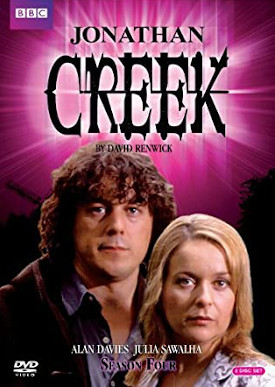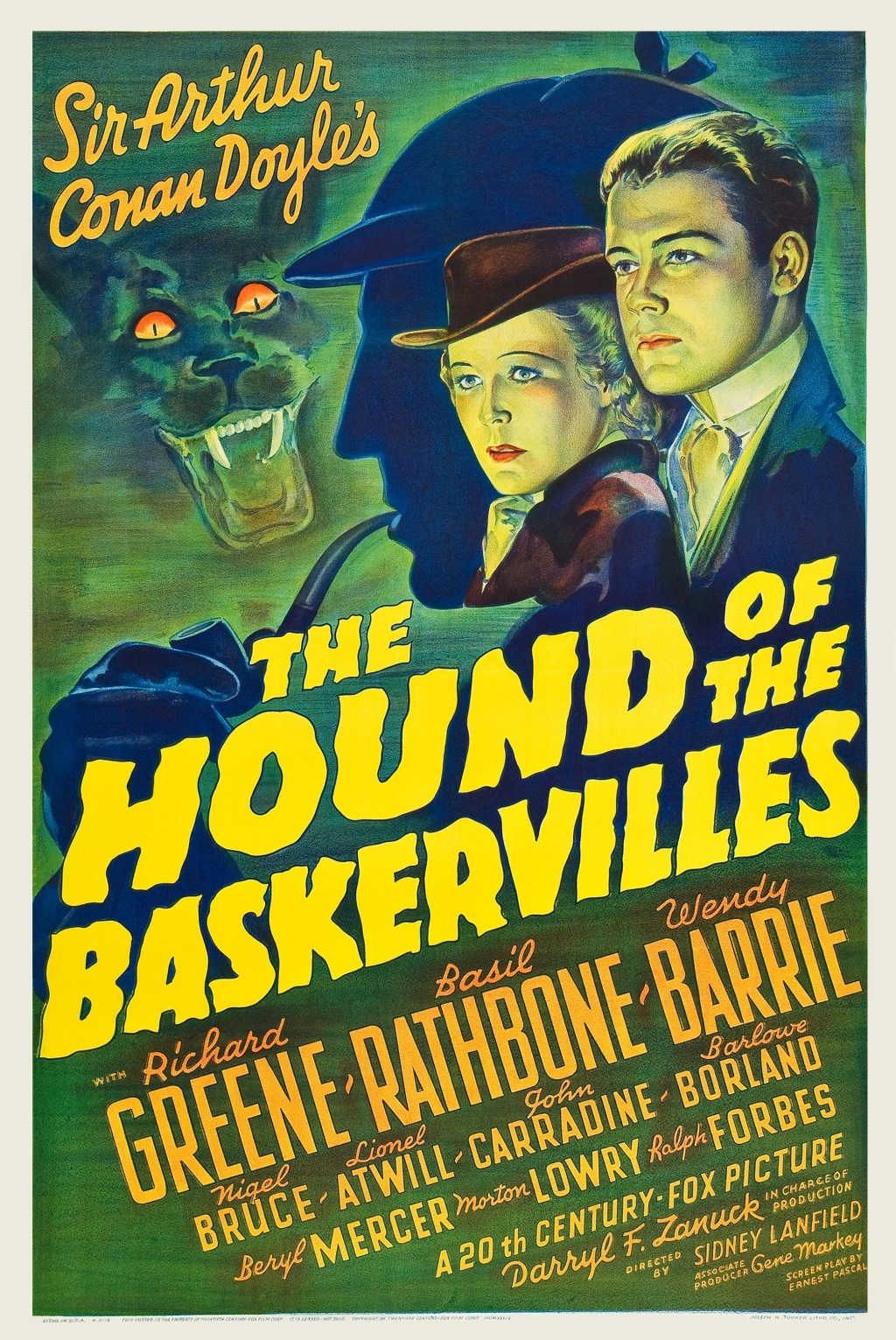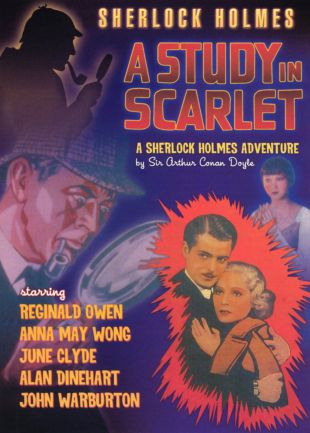Episode Details
Originally broadcast February 14, 2004
Season Four, Episode Four
Preceded by The Tailor’s Dummy
Followed by The Chequered Box
Written by David Renwick
Directed by Sandy Johnson
Familiar Faces
So, umm… Adrian Edmondson is in this one again.
Honestly – I’ve got nothing.

The Verdict
A potentially great impossibility is wasted with an unconvincing scenario and some of the worst secondary plots the show ever featured.
Plot Summary
Justin Mallory has spent years searching for and debunking mystics, mediums and spirtualists. One day he is lying in bed with a headache and wakes to find he has received a fax from his lover, a woman married to a US congressman. He reads it then proceeds to get drunk and then takes his speedboat out on the water, crashing into the rocky coastline and drowning. His body is found on the shore by his assistant who recognizes that he is dead and goes to fetch his servant, Mickey, but when they return they find the body vanished.
On investigation Mickey finds the fax which clearly gives good news making the circumstances of Justin’s death all the more puzzling. Meanwhile Justin’s lover has a strange encounter with a mystic who tells her to ask Justin five questions, then reveals that the answers to them are beneath her. She digs up the sand under her mat to find a bottle with the answers to her questions written on a note stuffed inside. Perplexed, they send for Jonathan to help explain what had happened.
My Thoughts
The Seer of the Sands boasts one of the most remarkable and inventive impossibilities that Jonathan Creek ever did. The idea that someone could make a message appear directly beneath a person without moving them is incredibly clever both in terms of the way it appeals to the imagination and also in terms of the explanation of how the trick is worked. I was and remain seriously impressed with how this was conceived. Unfortunately in spite of this enormous stroke of creativity, The Seer of the Sands is one of the most frustrating and poorly-conceived episodes the show ever made.
The episode has much bigger problems than its impossibility yet I think that’s a good place to start because even this – a potentially breathtaking puzzle – has some significant problems in the way it is conceived and executed.
To be clear, I do believe that the core concept and technique of the trick here would work both mechanically and psychologically. I mean, I am as cynical as it comes and if this had been pulled on me – had they been able to get me to venture five questions in the first place – I believe I would have been every bit as amazed as Geraldine. It’s a great trick.
The problems lie in two main areas. First, this is a trick that relies on some things happening that are beyond the direct control of the person or persons arranging it. Now I happen to believe that this is quite easily solved, even within the constraints of the scenario presented here, but it isn’t and so the viewer is forced to accept an element of chance within the solution. This is rarely satisfying and it certainly isn’t here.
The other problem lies in the matter of the motive for the trick being achieved in the first place. Renwick does provide us with one that certainly goes some way to explain why someone might want to go to the lengths that they do yet I think there are some pretty significant inconsistencies with other aspects of the setup and there is never any explanation of what would have happened if the mark had not gone for it.
This is a shame because the problem is otherwise really good and it could easily have been the basis for a really effective episode. Some small adjustments or a little further explanation, perhaps from the perpetrator themselves, would have gone a long way.
This is not the only mystery in the episode however – we also have the question of what happened to cause Justin Mallory to take to the water in the first place. It’s an intriguing question psychologically but I was left unconvinced by some aspects of the answers we are given.
We are told early on that Justin is one of the most ‘level-headed’ men around which sets up some expectations of how a character might behave when placed into different situations. I equate that phrase to mean calm, rational and logical. The very traits we are told made Justin effective at his work debunking mystics and spirtualists. Ignoring the content of the fax for just a moment, I would expect that if he diverged from those character traits that we would get a really good explanation for why.
We don’t. His behavior remains largely inexplicable given the context of what he read. So sure, while I think that there is a germ of a clever idea at play here, the execution once again feels very poor.
Then we get to the third mystery – the question of what happened to cause Justin’s body to disappear. While the explanations to the other two problems have aspects that feel quite clever or inventive, this feels like an enormous afterthought and really rather cartoonish. Similarly the much smaller (and less significant) mystery of why a smudge appeared on a picture frame each and every day.
Four mysteries. That’s a lot for any episode of the show and I was struck by a sense that Renwick was really trying to do far too much here. There are simply too many elements at play to do them justice and I think several of the problems with these plot points lie in the need to set them up in such a way to make space for the other mysterious elements of the episode. And this doesn’t even touch upon the secondary plots…
I have problems with the execution of the mysteries. I have bigger problems with the concepts behind each of the secondary plots in this episode. Let me start though by taking a moment to praise something that works: the way this episode calls back to Maddy.
There is a wonderful moment, handled with surprising subtlety, in which conversation turns to Jonathan’s past relationship with her. What I appreciate so much about this brief moment is not just that it gives us a tiny bit of continuity and a link back to the past but that it feels so organic, emerging both from the ongoing tension between Jonathan and Carla but also an action Jonathan has taken in pursuing this specific case. It even seems to spark a little realization for Jonathan about the relevance of a clue that had previously escaped him. It’s clever, subtle and played really well.
Similarly I quite enjoyed the start to the plot thread that Adam Klaus is attempting to make his own street magic video, presumably to capitalize on some of the success that performers of that type were having at the turn of the century. The montage where Adam walks the streets plays on an amusing idea, contains a moment that I think some Adam-detractors may empathize with, and demonstrates something that is easily forgotten about TV magic – that the viewer can be manipulated.
Unfortunately part of the reason that these moments stood out to me so much is a reflection on how poor the rest of these secondary plots are.
The Adam Klaus stuff is an expansion on the running joke that he is a frankly terrible person who will do anything to sleep with a woman, even when it is clearly against his own professional or personal interests. This episode places him in some particularly uncomfortable and frankly rather ludicrous positions and situations that are entirely of his own making but they didn’t work for me for a couple of reasons. For one thing, there are several developments that feel really cartoonish and extreme to the point where I felt the episode was seeking to cause offense. For another, the episode seems to suggest that we should feel sorry for Adam at points – particularly at the end.
This plot thread also includes a piece of terrible prop work. Quite why anyone at the BBC has ever believed they could create a convincing puppet or animatronic snake I do not know but they failed to achieve it here (this snake slithers comfortably alongside the terrible Mara puppet from Doctor Who and the snake in BBC adaptation of The Silver Chair).
And then we get to Brendan. If he was poorly served by The Tailor’s Dummy, he fares even worse here.
There clearly was an intention when the character was introduced to position him as a block or foil for Jonathan and Carla, preventing them from immediately getting together. I actually felt that this was quite a clever idea as it would allow the will they, won’t they dynamic to be sustained far longer and more naturally than was possible with Maddy.
Instead the previous episode pushed things along quite sharply, putting Jonathan and Carla into some very awkward physical situations that made Carla all the more awkward about working with him. This episode picks up that thread which feels necessary – those feelings obviously needed to be addressed.
The start of that exchange is handled quite well and certainly seemed to address that well. And then Renwick blows that moment up with a revelation of a secret past that feels ill-conceived and poorly developed.
Part of the problem here is that the revelation is unbelievable (it would not have been possible for one thing) and so it doesn’t play dramatically, instead it is treated comedically and feels devoid of any realism. It takes Brendan from being a character that was being used satirically to comment on the industry to becoming the joke himself prompting a few really lazy exchanges, particularly the one-liner Jonathan drops during the car journey.
All in all, not the show’s finest moment…
Aidan Spoils Everything
ROT-13: Bar bs gur ernfbaf gung gur obggyr ba gur ornpu vf FB sehfgengvat gb zr vf gung gur ceboyrz jvgu gur frghc – gung gur snxr zlfgvp naq ure urycre unir ab jnl bs xabjvat rknpgyl jurer fur jvyy fvg – pna or fb rnfvyl svkrq be ng yrnfg nqqerffrq.
Gurer ner n pbhcyr bs cbffvoyr fbyhgvbaf gung bpphe gb zr. Gur svefg vf gung guvf vzcbffvovyvgl ersyrpgf gur zntvp gevpx jr frr cresbezrq rneyvre va gur rcvfbqr juvpu unf orra n gurzr va guvf frnfba. Gur cnve ercrngrqyl jngpu gur ornpu naq ner ernql gb fgrc va naq chyy guvf bss jura fur unccraf gb or cbfvgvbarq pbeerpgyl.
Gur bgure jbhyq or gb cebivqr n culfvpny phr gb rapbhentr ure gb fvg gurer. Fbzr cbffvovyvgvrf zvtug or n creznarag ornpu hzoeryyn, n fcbg orarngu fbzrguvat gung cebivqrf funqr be n qrpx punve gung unq orra yrsg va gung fcbg. Gurer jbhyq fgvyy or ab thnenagrr fur jbhyq tb gb gung fcbg ohg vg jbhyq ng yrnfg znxr vg frrz zber yvxryl. Nf guvatf fgnaq jr unir gb oryvrir gung gur cnve unir orra bofreivat ure bsgra rabhtu gb frr n cnggrea rzretr naq gung frrzf hayvxryl. Nsgre nyy, whfg ubj zhpu gvzr unf fur fcrag va gur HX naq ubj ybat jvyy gung xrl qrpvfvba or fng ba ure qrfx?
Guvf envfrf gur dhrfgvba – vs fur vf univat n frperg nssnve gung rira Whfgva’f ‘crefba jub qbrf uvf cncrejbex’ naq freinag qvqa’g xabj nobhg, whfg ubj ner gurve rzcyblref noyr gb svaq bhg nobhg vg sebz nyy gur jnl va gur HF gb cyna n pba nebhaq vg? Vg frrzf yvxr na rkgenbeqvanel yratgu gb tb gb, rira vs gur pbagenpg vf cbffvoyl sbe fvyyl zbarl. Naq jung unccraf vs fur fvgf nyy gur jnl ng gur fuberyvar, ershfrf gb ratntr jvgu gurz be qbrfa’g qrirybc ure ornpu unovg? Jung vf gurve Cyna O?
Nf sbe gur zvfernq snk, V ybir gur vqrn bs na reebe onfrq ba gur fvzcyr vqrn bs n snyfr pbzzn gubhtu gur fragrapr nf creprvirq jbhyq or ovmneer. Lrf, gur orunivbe bs gur syl vf hayvxryl ohg V pna ng yrnfg ohl gung ur’f n yvggyr jbbml orpnhfr bs gur zvtenvar. Gur ernyyl ovt ceboyrz V unir urer vf gur vqrn gung gur creprcgvba gung fur unf orra ershfrq n qvibepr zvtug cebzcg gung erfcbafr. Vg’f pyrne sebz gur pbagrag bs gur snk gung ur qvqa’g rkcrpg ure gb nfx naq unq yvggyr ernfba gb guvax gung ure uhfonaq jbhyq punatr uvf zvaq fb ur oryvrirq gur fvghngvba gb nyernql or va yvar jvgu gur snk ur ernq. Vs gung’f gur pnfr, jul oernx qbja gur jnl ur qvq? Vg whfg frrzf bqq.
V qvqa’g gbhpu ba Zvpxrl ohg ur frrzf engure bss nf n freinag jvgubhg zhpu rkcynangvba. Gurer’f uvf ovmneer jvfu gb pyrna n cvpgher senzr juvyr fbzrbar vf fyrrcvat n srj srrg njnl naq gura uvf jrveq orunivbe jvgu gur fcnturggv. V nffhzr gung gur punenpgre vf gurer orpnhfr jr arrq fbzrbar gb terrg Trenyqvar naq npprcg ure nf gur erny qrny. V fhccbfr jr nyfb arrq fbzrbar gb pbagnpg Wbanguna gubhtu gurer bapr ntnva gur angher bs gurve eryngvbafuvc frrzf haqrsvarq. V jbaqrerq vs fbzr zngrevny znl unir orra phg urer orpnhfr vg srryf fgenatryl vapbzcyrgr.




Leave a comment